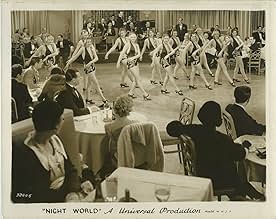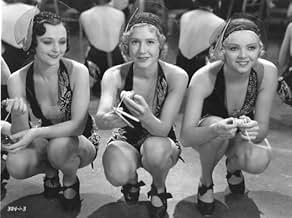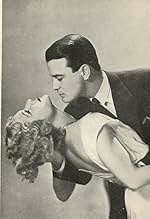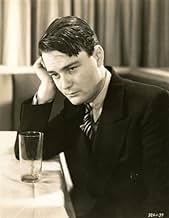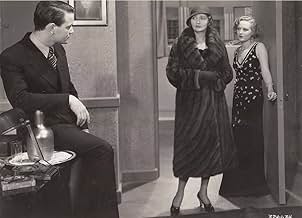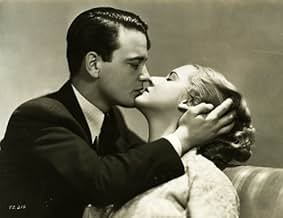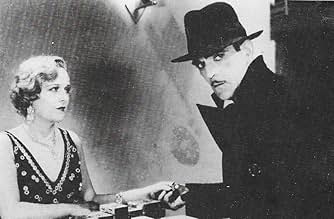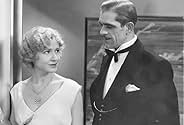Story of the goings-on at a Prohibition-era nightclub.Story of the goings-on at a Prohibition-era nightclub.Story of the goings-on at a Prohibition-era nightclub.
- Director
- Writers
- Stars
Alice Adair
- Chorine
- (uncredited)
Consuelo Baker
- Chorus Girl
- (uncredited)
Frank Beal
- Bit
- (uncredited)
Louise Beavers
- Maid
- (uncredited)
- Director
- Writers
- All cast & crew
- Production, box office & more at IMDbPro
Featured reviews
Poor Mae Clark was in loads of films yet is most known for getting a grapefruit in the kisser from James Cagney in 'Public Enemy.' So it's nice to see her in a part with a few more brains. She is just part of an odd mixed-salad of a cast. Some, like Boris Karloff as an awkwardly gangly night-club owner, and Bert Roach as a silly drunk, seem to be in strange waters. Others, like Lew Ayers and George Raft, get roles typical of their young careers. Though she has only one scene in this very short film, Hedda Hopper steals the show as the world's worst mother.
The only character to really warm to is The Doorman, Tim Washington (Clarence Muse). He is clearly in a horrible situation which those around pity at best and ignore at worst. So many African-American roles in the white films of the '30s are painful to watch, but Muse brings something special to this thankless part.
Cinematographer Merritt Gerstad shows an inventive eye both in the opening montage and in scenes that would otherwise be nothing to look at. And of course, we get brief Busby Berkeley numbers, which would never really work in a night club, but allowances must be made for Hollywood.
The only character to really warm to is The Doorman, Tim Washington (Clarence Muse). He is clearly in a horrible situation which those around pity at best and ignore at worst. So many African-American roles in the white films of the '30s are painful to watch, but Muse brings something special to this thankless part.
Cinematographer Merritt Gerstad shows an inventive eye both in the opening montage and in scenes that would otherwise be nothing to look at. And of course, we get brief Busby Berkeley numbers, which would never really work in a night club, but allowances must be made for Hollywood.
Fun, saucy, fast-moving and short, Night World is a neat little movie from the early thirties, before Prohibition was repealed, when Hoover was still in the White House; and with a Depression still new there was yet a Gatsby mood in the cities.
The credits of this movie are unusual. Busby Berkeley did the choreography. Alfred Newman composed what music there is. The cast is oddball for any sort of film, but especially peculiar for this kind: Lew Ayres, Mae Clarke, Boris Karloff, Hedda Hopper, George Raft and Jack La Rue. Director Hobart Henley handles his material extremely well, and gives it pace and energy. There is joy, sadness, corruption, disillusionment and heartbreak in the movie, and the ending is bittersweet but not downbeat.
The credits of this movie are unusual. Busby Berkeley did the choreography. Alfred Newman composed what music there is. The cast is oddball for any sort of film, but especially peculiar for this kind: Lew Ayres, Mae Clarke, Boris Karloff, Hedda Hopper, George Raft and Jack La Rue. Director Hobart Henley handles his material extremely well, and gives it pace and energy. There is joy, sadness, corruption, disillusionment and heartbreak in the movie, and the ending is bittersweet but not downbeat.
Yes, it's a cheap versions of GRAND HOTEL, but I think it works just fine. I'm going to disagree with some previous reviewers: I think Karloff is marvelous as the club owner, bringing a fierceness and bravado to it that others would lack. The rest of the cast is also good: Ayres, Marsh and Muse all register strongly. Hedda Hopper is indeed amazing as the bad mother. And George Raft stands out in his small part. A little of it is creaky and dated, but overall, I thought the camera-work was fluid and fine, the story moved fast and the characters were well-written. Nice little Busby Berkeley number near the top, too. Well worth checking out.
Universal in the early 30's is mainly remembered as the home of the horror film, but in fact they ventured into other kinds of films as well. This fast little precode seems like it might have come from Warner Bros., but instead it is the product of Universal. Boris Karloff plays "Happy" the owner of a night club and husband to an unfaithful wife, not that he doesn't have a roving eye himself. George Raft shows up briefly in the film as a tough guy who has an eye for chorus girl Mae Clark. Finally there is Lew Ayres as the son of a prominent family whose mother has just recently shot his father dead and been acquitted. This is not the mom of a heart of gold that you see in so many depression era films, and the young man spends night after night in Happy's club trying to forget his troubles. Add in a snappy Busby Berkeley number and Happy's run-in with the suppliers of his bootleg whiskey and you have a very fast moving little precode. The film is visually interesting too, with an introduction similar to 1929's "Broadway", also by Universal, minus the silver-skinned giant calling the city to awaken and join him in his debauchery. Highly recommended, that is, if you can ever find a copy.
Fun, somewhat bizarre pre-coder about one night at a nightclub and the assorted people there. Worth a look for the great cast and the odd mixture of gangster movie and musical comedy. Lew Ayres plays a rich guy drowning himself in drink because his mom killed his dad. Mae Clarke plays a showgirl who helps him. The two fall in love quickly, Old Hollywood style. They have a cute chemistry. Great support from Boris Karloff, Clarence Muse, George Raft, Bert Roach, Dorothy Revier, and, hey, there's future gossip columnist Hedda Hopper. Also features a forgettable number choreographed by Busby Berkeley. Ayres is fine but upstaged by the rest of the cast, especially Clarke and Muse. It's from Universal although it seems a bit like it's trying to be a WB movie. A good way to pass an hour. There's also a Frankenstein joke, although Karloff is not in that particular scene.
Did you know
- TriviaMae Clarke was sick during most of the production of The Impatient Maiden (1932) and this film, which were made back-to-back. At the end of this film, she was so sick that her face swelled up and she was having hallucinations. She was able to go for detox treatments in Palm Springs and Pasadena.
- Quotes
'Happy' MacDonald: Never give a sucker an even break.
Ed Powell: I never give anybody an even break.
- ConnectionsFeatured in The Universal Story (1996)
- How long is Night World?Powered by Alexa
Details
- Runtime
- 58m
- Color
- Aspect ratio
- 1.37 : 1
Contribute to this page
Suggest an edit or add missing content

